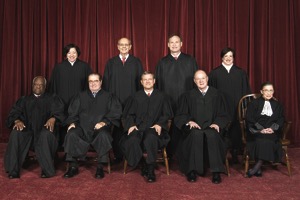
The “original” Day of Decision for marriage equality in California was May 15, 2008, when the state Supreme Court endorsed a constitutional right to same-sex marriage. On Day of Decision II the same court declined to overturn Prop. 8. In 2013, the U.S. Supreme Court ruled against DOMA and overturned Prop. 8, followed by a string of district and appellate court decisions, stays and liftings of those stays. At that point, I lost count. More recently, the days of decision were Supreme Court refusals to hear challenges to appellate rulings in favor of marriage equality.
On Friday, the Supreme Court announced there will be at least one more day of decision, sometime after they hear oral arguments on the Sixth Circuit decision in support of marriage equality bans. Will it be the final decision that brings same-sex marriage to the nation? I don’t know, but I’m cautiously optimistic the decision will somehow be in favor of equality.
Most Court-watchers think the Supremes felt they had to resolve the “circuit split” created by the Sixth Circuit’s disagreement with other decisions supporting equality. That may be true in part, but allowing a review by the full Sixth Circuit, not just the three judge panel, would seem more consistent with the Court’s recent slow walk toward equality. So what changed?
It takes five justices to decide a case, but only four to grant a review. The positive scenario involves four progressive justices, most likely Kagan, Breyer, Ginsburg and Sotomayor, feeling they have finally locked in Justice Kennedy’s fifth vote for overturning all state bans on same-sex marriage. In the rosiest of pictures, Chief Justice Roberts and Justice Alito come along as well, having already joined a decision not to delay same-sex marriage in Florida.
More concerning would be the four justices that voted against overturning DOMA deciding to take the case. Why this one instead of the prior appeals? Maybe they see an opportunity in a legal twist of this challenge. Maybe they want to press the issue before Justice Kennedy is comfortable joining a sweeping decision.
Maybe they want to get the issue off the table for Republican presidential candidates in 2016. Most worrisome is an argument that Federal Courts don’t have jurisdiction on marriage and can’t overturn state bans. (Advocates of this theory note that Windsor was a tax case and Prop. 8 was about standing, so neither is a precedent for directly addressing bans.)
With marriage equality in 36 states, it makes sense for the Court’s conservatives to take a last shot at victory, or at least limiting a loss.
If and when this Supreme Court makes a final decision on same-sex marriage bans, I think it will be 7-2 against them (Thomas and Scalia dissent), with Chief Justice Roberts joining the liberals to be on the right side of history and to write a decision peppered with protections for speech and religion.
But it might not happen this year, when the Court could duck a little longer by somehow kicking it back to the Sixth Circuit or crafting a narrow decision that takes one more baby step toward equality for all.











